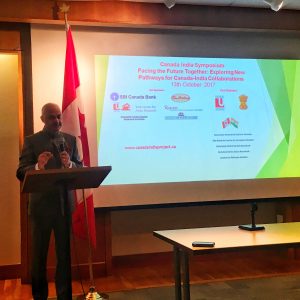I have been in Delhi, and in one of its many surrounding suburbs (Greater Noida), this past week, with YorkU colleague, Dr. Nivedita Das Kundu, networking and building CIPRI (Canada-India Project for Research and Innovation) connections for the York Centre for Asian Research.
Nivedita, a political scientist and International Relations scholar, lived, studied and worked in Delhi, before coming to Canada a couple of years ago. She and her many academic colleagues in Delhi, organized a full schedule of talks, meetings and networking time with faculty, researchers and students at Birla Institute of Management Technology (BIMTECH) and the United Service Institute of India. We also visited the Department of Science and Technology (DST) where we learned about programmes supporting research collaborations with Canada. I was thrilled to learn about the DST programmes supporting women in STEM, including those aimed at getting women who've taken time out of their careers, to get back into work.
The best thing about the past week was getting to spend International Women's Day in Delhi! This panel of photos shows BIMTECH director, Dr. Chaturvedi speaking about the #MeToo movement (!) after five women professors spoke. And this group didn't shy away from addressing topics of intersectionality.
Celebrating #InternationalWomensDay with the warm, welcoming & innovative faculty & staff of @BIMTECHNoida.
Look at all of these great women profs!
Great speeches acknowledging #MeToo & the need to empower lower income & less well-educated women.#IWD2018 #WomensDay #EDI pic.twitter.com/8SDtTW6Pru— Dawn Bazely (@dawnbazely) March 8, 2018
We Have Come a Long Way in a Short Time
It's barely a year since Nivedita contacted me because she was interested in learning more about arctic research at York University. She had heard about the Gas, Arctic Peoples and Security (GAPS) project that I developed with Prof. Gunhild Hoogensen for International Polar Year (2006-11). Nivedita attended my arctic ecology talk for high school students that I gave at the York Region science fair at Keele Campus.
Our conversation quickly pivoted towards our shared interest in India-focussed research, when I told Nivedita about my collaboration with visiting professor, Dr. Shibani Chaudhury, and my plan to spend part of my sabbatical in India, at Visva Bharati (university).
One thing led to another. Before I knew it, I found myself co-organizing a symposium to showcase and discuss research with a Indian focus, with this dynamic new colleague! Full disclosure: I have worked with lots of IR political scientists, and I'm accustomed to their ambitious, whirlwind, ways of working.
Our October 2017 meeting, Mapping Pathways for Canada-India Collaboration, was organized on a shoestring budget, and a success. It paved the way for the next stage: CIPRI at YCAR -- the Canada-India Project for Research and Innovation.
During this trip to Delhi, I have even circled back to the original reason for why Nivedita originally contacted me: the arctic. In Delhi, I found myself discussing Environmental and Human Security in the Arctic, as I learned more about India's and China's arctic interests from Cdr. S. Sarangi!
The Solution to a Shoestring Conference Budget: Harnessing Student Human Capital!
Successful conferences and symposiums require huge amounts of tedious, hard work behind the scenes. With only Nivedita and myself as co-organizers, and Robarts Centre for Canadian Studies providing valuable administrative support, we turned to that most precious source of person-power -- York University Biology research practicum students!
The zero credit Biology practicum aims to provide students with a supervised volunteer research experience. Two students in my summer research practicum group signed on to assist Nivedita and to learn how to organize a conference. They developed the website, developed a budget and fundraising ideas, advertised and helped to host the event. By the day of the symposium, Friday October 13th, 2017, a 10-student volunteer team helped with everything from room set up to introducing speakers and recording talks.
Nivedita was, and is, a tireless organizer, advocate and fund-raiser. From April to October 2017, she led the student team in organizing the symposium. Nivedita secured support from the Consul General of India in Toronto, the State Bank of India, and several research centres and faculties at York University.
To my delight, the programme was rich and fascinating, featuring diverse research and panels from both established, and new researchers, as well as speakers from businesses and community organizations. Most importantly, our undergraduate and graduate students were very professional, and have been able to add "Conference Organizing Skills" of various kinds, to their resumés.
For those of use concerned about students graduating with both critical thinking and practical skills, the provision of opportunities, for students to be mentored in developing project management skills, is essential.


